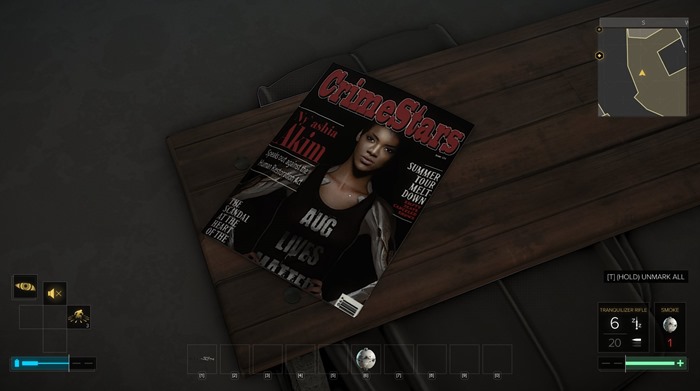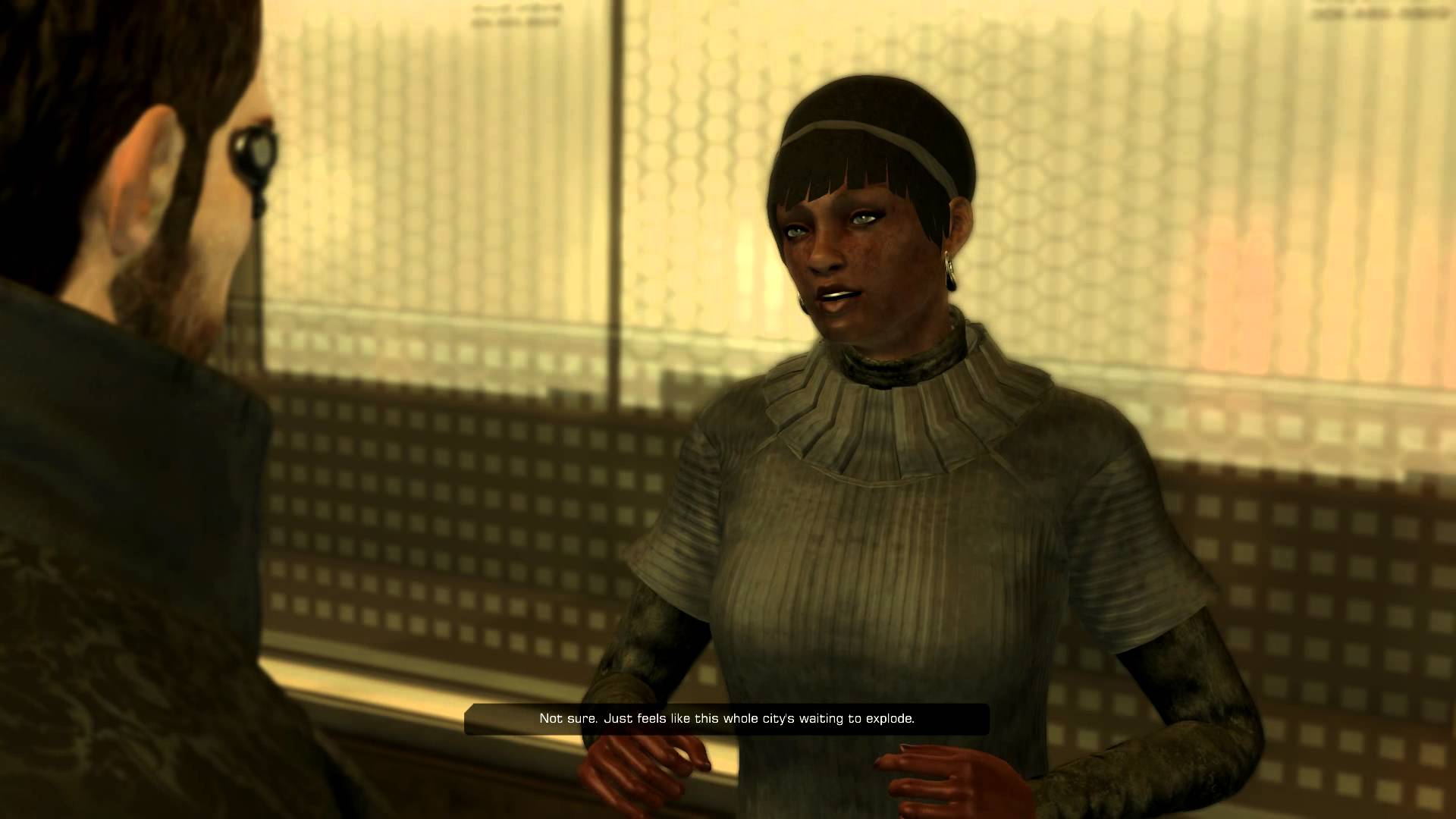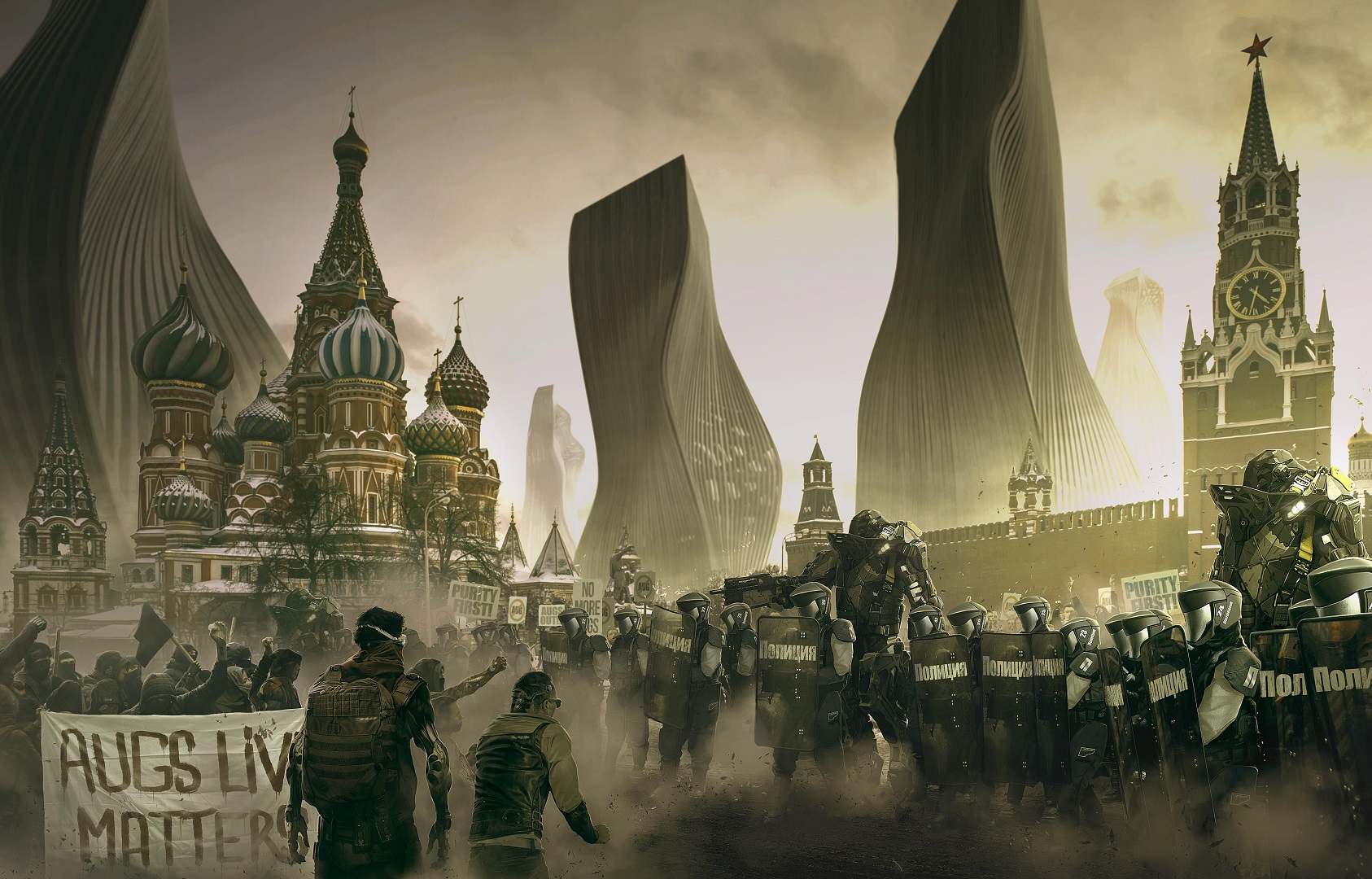With futuristic, sci-fi sequel Deus Ex: Mankind Divided, developer Eidos Montreal has once again found itself walking atop the fiery coals of controversy.
The developer first landed itself in trouble by referring to the game’s poor treatment of augmented humans (‘augs’ are treated as second class citizens, forced to live in ghettos) as the ‘Mechanical Apartheid.’ Apartheid is the term used to describe the horrific, and very real, period of segregation and oppression faced by black South Africans during the 20th century (1948-94). Many have questioned whether it is appropriate for the term, which is based on the South African language of Afrikaans (which is itself based upon the Dutch language, introduced to the territory by Dutch settlers) to be adapted and used as a slogan in a video game.
Augs Lives Matter
In subsequent marketing materials – concept art created to further depict this oppression – the movement in favour of better treatment of augmented people is referred to as ‘Aug Lives Matter. It’s an unmistakeable and questionable nod of the head to the real-world movement for the better treatment of black people, Black Lives Matter.
Within Mankind Divided, Aug Lives Matter is simultaneously presented as a terrifying terrorist group but also as rebels with an honourable cause. One in-game crime magazine even features an Aug Lives Matter protester as its cover star.
Eidos claims that Aug Lives Matter was a term coined years before BLM rose to prominence but in spite of this flimsy reasoning, gamers and human rights/social justice advocates alike have been outraged that the developer could so carelessly make these comparisons in the game. This is an especially sharp source of pain as the message and movement that Mankind Divided is co-opting are still trying to be heard as the discrimination of black lives in the real world – and not the fictional people that Eidos has created – continues.

Moreover, the developers stresses that it has no intentions to offend or portray any particular ethnicity in a bad light. One member of the game’s development team has also suggested that it wants to take a morally grey stance and let players make their own minds up on the events and actions in the game.
Eidos Montreal’s frustrating responses towards the complaints being levelled against Deus Ex are disappointing. However, it’s easy to drop that disappointment and feel completely enraged when considering that this isn’t even the developer’s first time at the racial insensitivity rodeo.
Letitia the Trash Lady
In 2011’s Deus Ex: Human Revolution, which was also developed by Eidos Montreal, African-American NPC Letitia (nicknamed by fans, ‘Letitia the Trash Lady’) raised eyebrows due to her accent. Letitia is a homeless informant who tells Jensen about the state of the city (Detroit) as she rummages through a garbage can. Letitia’s portrayal has been criticised for sounding ‘minstrel-like, and has been compared to an Aunt Jemima cartoon.

Letitia’s over-exaggerated portrayal is impossible to defend; it’s what you might expect someone to produce if they had a) never met a black person in real-life and b) only knew of black people’s existence through offensive and disgustingly racist cartoons that aim to depict African-Americans as poorly educated and, in any way, ‘less than’ white people.
Although Letitia exists alongside various other black NPCs who otherwise avoid stereotypes (many have high-ranking jobs and they most definitely do not sound like caricatures come to life), it just makes Letitia – who appears to have been copied and pasted from the 1940s – stick out even more.
https://www.youtube.com/watch?v=j5mjZ9peibo
Bobby The Bartender
Also in Human Revolution is the infamous bartender scene. As Jensen visits a bar in China, an Asian bartender explains that he isn’t the real “Bobby the bartender.” But this doesn’t seem to pose a problem for Jensen, who apparently doesn’t care who he speaks to, as he replies that it’s “kinda hard to tell one lackey from another in here, you boys all look alike to me.”
It doesn’t take any mental gymnastics to understand how it’s problematic for Jensen, who is white, to refer to an Asian NPC (and his coworkers) as somehow being identikit clones.
Is this Eidos’ fourth-wall breaking way of pointing fun at its own, unremarkable and indistinguishable character designs? Unlikely, as not-Bobby soon replies “watch it gwei lo [derogatory term for a white Westerner], you wouldn’t want to die before you get a chance to polish the rust off those hi-tech augs of yours.” Jensen’s being a racist dick and everybody knows it.
And it’s not even as though Jensen is alone in this anti-Asian thinking either as another NPC (Zeke Sanders) in Human Revolution refers to Chinese people as “chinks.”
Moreover, just like the Letitia situation, the accents sported by the Chinese NPCs have also drawn criticism. On forums and on social media, many Asian gamers have complained that the NPCs’ accents both in Human Revolution and the original Deus Ex just don’t sound real or authentic and again, they seem to have been directed and produced by a developer acting upon its own imagining of what someone of that ethnicity may sound like.
Now, I don’t expect racism to simply cease to exist in the game as clearly the people of Mankind Divided (which is set in 2029) are too near-sighted to even avoid the oppressive, racist actions of their predecessors and 10-odd years arguably isn’t long enough for these kind of systems to be dismantled, even in a fictional reimagining of society.
However, that doesn’t mean that these hurtful epithets and ignorant caricatures need to be preserved.
A Lack of Value
The racism allegory in Mankind Divided is already clear, which is why Eidos Montreal’s actions caused so much outrage in the first place. Did the developer need to feature actual examples of real-life racism on top of this? And did it need to add further insult to injury by making the same offensive missteps twice in a row?
As Mankind Divided released to mostly positive reviews and sales of the game also appear to be quite promising, it seems likely that another title in the Deus Ex series will happen at some point. Whoever takes up the development mantel, be it Eidos Montreal or a different team entirely, will have a new opportunity to lead the Deus Ex franchise into new, more considerate territory, ditching the future-set series’ issues with race and culture firmly in the past.
Jasmine Henry
Latest posts by Jasmine Henry (see all)
- Twitch Spambot Drama Highlights Another Side to Harassment Issue - January 25, 2018
- Overwatch League Skin Unlocks Have a Dumb ‘Easter Egg’ - January 11, 2018
- Call of Duty: WWII’s Female Soldier ‘Rousseau’ Deserves Her Own Spin-Off - December 8, 2017

